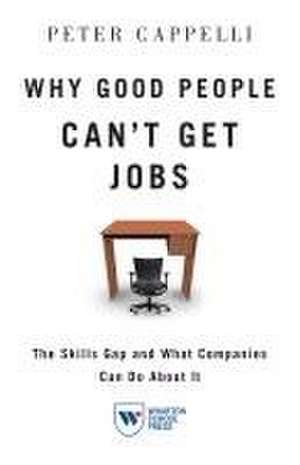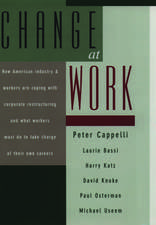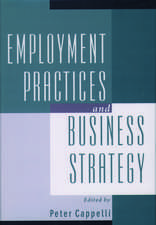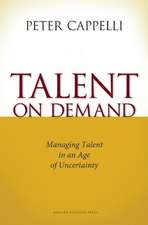Why Good People Can`t Get Jobs – The Skills Gap and What Companies Can Do About It
Autor Peter Cappellien Limba Engleză Hardback – 28 mai 2012
Peter Cappelli confronts the myth of the skills gap and provides an actionable path forward to put people back to work.
Even in a time of perilously high unemployment, companies contend that they cannot find the employees they need. Pointing to a skills gap, employers argue applicants are simply not qualified; schools aren't preparing students for jobs; the government isn't letting in enough high-skill immigrants; and even when the match is right, prospective employees won't accept jobs at the wages offered.
In this powerful and fast-reading book, Peter Cappelli, Wharton management professor and director of Wharton's Center for Human Resources, debunks the arguments and exposes the real reasons good people can't get hired. Drawing on jobs data, anecdotes from all sides of the employer-employee divide, and interviews with jobs professionals, he explores the paradoxical forces bearing down on the American workplace and lays out solutions that can help us break through what has become a crippling employer-employee stand-off.
Among the questions he confronts: Is there really a skills gap? To what extent is the hiring process being held hostage by automated software that can crunch thousands of applications an hour? What kind of training could best bridge the gap between employer expectations and applicant realities, and who should foot the bill for it? Are schools really at fault?
Named one of HR Magazine's Top 20 Most Influential Thinkers of 2011, Cappelli not only changes the way we think about hiring but points the way forward to rev America's job engine again.
| Toate formatele și edițiile | Preț | Express |
|---|---|---|
| Paperback (1) | 92.56 lei 3-5 săpt. | |
| Wiley – 28 mai 2012 | 92.56 lei 3-5 săpt. | |
| Hardback (1) | 299.80 lei 3-5 săpt. | +49.91 lei 4-10 zile |
| MT – University of Pennsylvania Press – 28 mai 2012 | 299.80 lei 3-5 săpt. | +49.91 lei 4-10 zile |
Preț: 299.80 lei
Nou
57.37€ • 59.68$ • 47.37£
Carte disponibilă
Livrare economică 25 martie-08 aprilie
Livrare express 08-14 martie pentru 59.90 lei
Specificații
ISBN-10: 1613631278
Pagini: 108
Dimensiuni: 147 x 222 x 13 mm
Greutate: 0.29 kg
Editura: MT – University of Pennsylvania Press
Notă biografică
Cuprins
Preface
Introduction
Chapter 1: Why Aren’t the Vacancies Being Filled?
Chapter 2: The Skills Gap Debate: Deconstructing Demand
Chapter 3: Workforce Facts and Myths: Parsing Supply
Chapter 4: Something Is Wrong with the Hiring Process
Chapter 5: A Training Gap, Not a Skills Gap
Chapter 6: A Way Forward
Conclusion
Notes
About the Author
Recenzii
“Explodes the 'skills gap' explanation favored by many corporate leaders and human resources consultants."
—Jena McGregor, The Washington Post
“Peter Cappelli’s new book addresses one of today’s major conundrums: why do so many jobs in America remain unfilled in the face of persistently high unemployment? With so many concerned observers looking to the government to solve the jobs crisis, Cappelli’s book is a refreshing and highly readable treatise on the roles and responsibilities of the private sector in matching job seekers to jobs. A must-read for those interested in how to get US employment back on track.”
—Jennifer Blanke, Lead Economist, World Economic Forum
“Peter Cappelli has produced a valuable and very readable examination of the important, but often misunderstood, skills gap problem. He punctures many common myths and outlines a sensible way to better match the demand for, and supply of, skills.”
—Ray Marshall, Rapoport Centennial Chair of Economics and Public Affairs, University of Texas at Austin, and Former Secretary of Labor
“It is high time to dismiss a silo approach to education and workforce and focus on the overall objective of these efforts, which is ensuring that every American has access to a training mechanism that will allow them to maximize their human potential. Such an approach requires greater engagement of corporate human resource departments, training providers and government leaders. Bravo to Dr. Cappelli for highlighting the importance of taking a supply chain approach to worker training and public-private partnerships.”
—Cordell Carter, Former Vice President, Public Policy, Business Roundtable


























